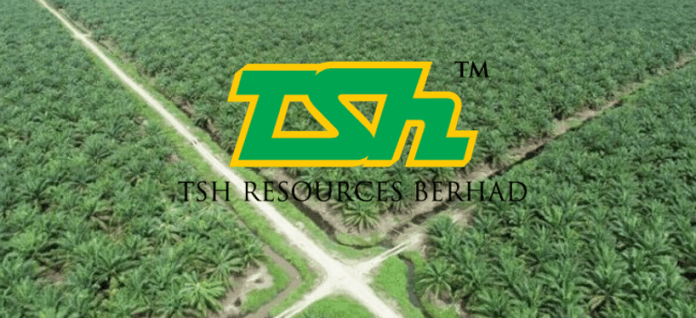TSH Resources Bhd’s is ready to embark on new expansion cycle, and the group has started expanding its oil palm area by another 20% to 25% within the next 2 to 3 years after its northeast Kalimantan land sales, according to Kenanga Research.
“After the sale, TSH should still have 60k Ha of land left with only 40k Ha planted up with oil palm. More importantly, the divesture has allowed TSH to re-capitalise and it is now planning to develop new oil palm area.
“The top priority for the next two to three years is to grow organically, planting up another 8,000 to 10,000 Ha of oil palm land which the group already owns.
“Estimated capex of RM200 million to RM300 million will be funded by a mix of sale proceed, operating cash flows as well as borrowings,” it said in its Company Update today (Jan 29).
THS was saddled with RM637 million in net debt in April 2022, which led it to agree to sell 13,898 hectares (Ha) of mostly unplanted agriculture land in Northeast Kalimantan for RM731 million cash.
7,817 Ha of the land was sold in August 2022 followed by another 575 Ha in January 2023. All in all, TSH has received RM457 million in cash.
“(After the divestment, TSH now has minimal net gearing). Coupled with operating cash flows, net debt has been pared to just RM88 million as of September 2023. Disposal of the remaining 5,506 Ha for RM274 million cash should conclude by mid-2024.
“Altogether, the divestment has already enabled TSH to substantially de-gear and the group can now consider expansion once again,” the research house said.
It maintained its OUTPERFORM call, its FY23 and 24F cash earnings per share (CEPS), and target price (TP) of RM1.30 based on average P/NTA of 0.8x for smaller to mid-sized plantation players.
“There is no adjustment to our TP based on ESG given a 3-star rating as appraised by us.”
Kenanga said plans for expansion could be good news to TSH as in the long term, the group expects more modest growth from palm oil supply even as edible oil demand is likely to continue growing.
“Crude palm oil (CPO) is expected to trade between RM3,500 to RM4,000 per metric tonne (MT)but lower for TSH, at RM3,000-3,500 per MT, as most of its CPO is sold at Indonesian prices.
“However, its FY24 and FY25F margins are likely to improve compare to FY23 on lower input costs such as fertiliser and fuel. The weakness in palm kernel (PK) prices should also see modest recovery FY24,” it added.
Moreover, the group is also studying carbon market opportunities following its secondary listing in SGX Mainboard, the research house said.
“In September 2023, SGX welcomed the secondary listing of TSH to its Mainboard. TSH’s primary listing remains on Bursa but sees wider opportunities with a SGX presence.
“The bulk of its earnings are already from Indonesia; hence, an SGX listing could provide greater flexibility in terms of funding, regional growth, and wider carbon-related opportunities in term of market or trading.”
The risks to Kenanga’s call include Western hostility towards palm oil on sustainability and bio-diversity issues, impact of weather and labour shortages on production, weak CPO and palm kernel prices, and cost inflation particularly fertilizers.









